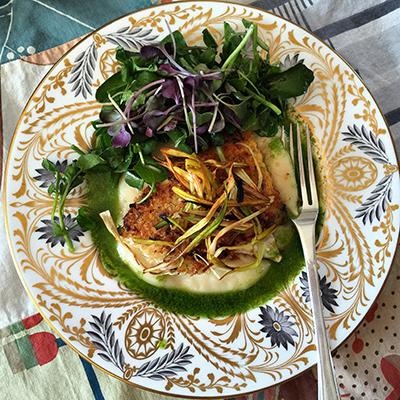Seasons by the Sea: Great Black Cooks

Having previously dedicated a whole column to my idol, Edna Lewis, her “Taste of Country Cooking” and numerous accomplishments, it’s time to focus on some other significant African-Americans who have contributed greatly to the cuisine of our country.
It is a fact that every president who has lived and worked in the White House was cooked for and served by African-Americans. There was a brief blip on the radar, of Jackie Kennedy firing the kitchen staff and bringing in all French chefs, but this changed back immediately when Lyndon Johnson became president. He brought along with him Zephyr Wright, who cooked for his family from 1942 to 1969. He consulted her on the March on Washington for Jobs and Freedom, and he gave her his pen after signing the Civil Rights Act of 1964, saying, “You deserve this more than anyone else.”
F.D.R. had Lizzie McDuffie and Daisy Bonner, Benjamin Harrison had Dolly Johnson, George Washington had Hercules, and the Trumans, Vietta Garr. Often a fancier chef would cook for state dinners and other big events, but the beloved home cooks prepared the family meals on a day-to-day basis. F.D.R. even had Daisy whip up some sweet and sour pig’s feet for Winston Churchill.
The first African-American chef to be offered the job of White House executive chef was Patrick Clark, who turned down Bill Clinton’s offer. Marcus Samuelson was the first black guest chef at the White House under the Obama administration.
Mr. Clark, probably the first black superstar chef, cooked all over the world and settled in New York to cook at such landmarks as Regine’s, Odeon, and Cafe Luxembourg. His last post, before he died at the age of 42 awaiting a heart transplant, was at Tavern on the Green, where he made his famous grouper on a bed of mashed potatoes with frizzled leeks and chive oil, lemon pudding, and very truffled twice-baked potatoes.
There are a few African-American cooks on TV, the Neelys, offering down-home, Southern-style cooking on the Food Network, along with Roble Ali, Gerry Garvin, Ron Duprat, Herb Wilson, and Tre Wilcox.
If gorging on “classic” soul food fare such as the Neelys’ pork-barbecue-stuffed baked potato, spicy fried wings, and grilled pound cake sundaes is not your idea of nutritious eating, then how about paying some attention to Bryant Terry, cookbook author and activist? Mr. Terry lives in Oakland, Calif., where he is an advocate for urban farming. His latest book, “Afro-Vegan: Farm Fresh African, Caribbean, and Southern Flavors Remixed,” teaches us how to recreate some beloved dishes with less fat and no meat. He points out that the roots of African-American cuisine are healthful ingredients such as mustard, turnip, kale, and collard greens, butter beans, and sugar snap peas, black eyed peas, and sweet potatoes.
Marcus Samuelsson, born in Ethiopia and raised in Sweden, became executive chef at Aquavit by the age of 24. He was the youngest chef to earn a three-star review from The New York Times. And what about our very own B. (Barbara) Smith, who had a number of eponymously named restaurants, including in Sag Harbor. She is arguably the first lifestyle and entertainment expert, along with being a model and author.
Living and working in Washington, D.C., most of my life gave me a bit of education about Southern and African-American cooking. From Lisa I learned how to season a cast-iron skillet and make the best fried chicken and Johnny cakes. Bill and Faith taught me how to accompany Chesapeake Bay crab cakes with Tabasco sauce, lime wedges, and mustard. Charlene has taught me the importance of lots of fresh herbs, and I have the utmost respect for the lowly catfish, a muddy bottom feeder if ever there was one.
On occasion, my NPR colleagues and I would make a pilgrimage to the Florida Avenue Grill, the world’s oldest soul food restaurant. Seated with people from the neighborhood would be congressmen and lobbyists, senators and pastors, gorging on macaroni and cheese, collard greens, and what I have since learned is called “cop cobbler,” an appallingly sweet combination of glazed doughnuts topped and baked with canned peaches. The food was cheap and satisfying.
How far have we come since Lyndon Johnson begged Zephyr for more fattening food and her response was, “I am going to be your boss for a change?” Not far, I’m afraid. There are more African-American cooks and chefs than ever before, but still not enough. Here’s hoping we can steer away from the stereotypes of chitterlings and greasy beans, Aunt Jemima and Uncle Ben. Go ahead and call me Rachel Dolezal, but if you ask me, this is (soul) food for thought.
Click for recipes
